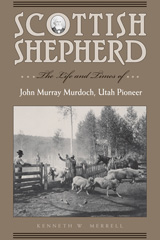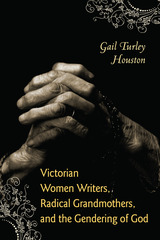3 books about 1820-1910

Ever Yours, Florence Nightingale
Selected Letters
Florence Nightingale
Harvard University Press, 1990
For many, Florence Nightingale is the most famous woman of her day, second only perhaps to Queen Victoria. Celebrated and beloved by the public and her friends, considered an irritant by politicians and bureaucrats, the great reformer remains a figure of considerable controversy. In this full 'life in letters' we see her at first hand. Martha Vicinus and Bea Nergaard weave together a narrative account and a selection of her letters in such a way as to create--in Nightingale's own words--a fascinating portrayal of the woman, her career, and her concerns.
[more]

Scottish Shepherd
The Life and Times of John Murray Murdoch, Utah Pioneer
Merrell, Kenneth W
University of Utah Press, 2007
Now in paperback, this award-winning history tells the story of the author’s great-great grandfather, John Murray Murdoch, who came to America from Scotland to gather with other members of the Church of Jesus Christ of Latter-day Saints during the nineteenth century.
Murdoch embraced Mormonism and set out for the Utah Territory in 1852 with his wife, Ann, and their family. En route they suffered the deaths of their two young children. Two years later, John’s mother, Wee Granny, and Ann’s brother, James Steele, both perished, along with many others of the ill-fated Martin handcart company, as they attempted to immigrate to Salt Lake City.
Murdoch was a respected member of the community and participated in the military preparations and maneuvers against the U.S. Army in the 1857 Utah War. Eventually the family moved to the Heber valley as early settlers there. Murdoch later became one of Wasatch county’s first elected officials and helped establish the sheep-ranching industry in Utah. The 'everyman' aspect of John Murdoch’s life makes his a compelling story. It will fascinate anyone interested in the individuals who helped create Utah's history.
Winner of the Evans Handcart Award.
Murdoch embraced Mormonism and set out for the Utah Territory in 1852 with his wife, Ann, and their family. En route they suffered the deaths of their two young children. Two years later, John’s mother, Wee Granny, and Ann’s brother, James Steele, both perished, along with many others of the ill-fated Martin handcart company, as they attempted to immigrate to Salt Lake City.
Murdoch was a respected member of the community and participated in the military preparations and maneuvers against the U.S. Army in the 1857 Utah War. Eventually the family moved to the Heber valley as early settlers there. Murdoch later became one of Wasatch county’s first elected officials and helped establish the sheep-ranching industry in Utah. The 'everyman' aspect of John Murdoch’s life makes his a compelling story. It will fascinate anyone interested in the individuals who helped create Utah's history.
Winner of the Evans Handcart Award.
[more]

Victorian Women Writers, Radical Grandmothers, and the Gendering of God
Gail Turley Houston
The Ohio State University Press, 2013
If Victorian women writers yearned for authorial forebears, or, in Elizabeth Barrett Browning’s words, for “grandmothers,” there were, Gail Turley Houston argues, grandmothers who in the late eighteenth and early nineteenth centuries envisioned powerful female divinities that would reconfigure society. Like many Victorian women writers, they experienced a sense of what Barrett Browning termed “mother-want” inextricably connected to “mother-god-want.” These millenarian and socialist feminist grandmothers believed the time had come for women to initiate the earthly paradise that patriarchal institutions had failed to establish.
Recuperating a symbolic divine in the form of the Great Mother—a pagan Virgin Mary, a female messiah, and a titanic Eve—Joanna Southcott, Eliza Sharples, Frances Wright, and others set the stage for Victorian women writers to envision and impart emanations of puissant Christian and pagan goddesses, enabling them to acquire the authorial legitimacy patriarchal culture denied them. Though the Victorian authors studied by Houston—Barrett Browning, Charlotte Brontë, Florence Nightingale, Anna Jameson, and George Eliot—often masked progressive rhetoric, even in some cases seeming to reject these foremothers, their radical genealogy reappeared in mystic, metaphysical revisions of divinity that insisted that deity be understood, at least in part, as substantively female.
[more]
READERS
Browse our collection.
PUBLISHERS
See BiblioVault's publisher services.
STUDENT SERVICES
Files for college accessibility offices.
UChicago Accessibility Resources
home | accessibility | search | about | contact us
BiblioVault ® 2001 - 2024
The University of Chicago Press









